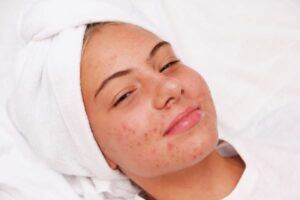The topic of hormonal acne and diet is one that often seems controversial or mythical to many. Although this may be the case, the reality right now is that so many studies have been conducted that show the correlation between acne, or if you wish, hormonal acne, and diet.
An important aspect to consider is how your diet may precipitate or contribute to acne if you are acne-prone.
Another aspect also worth focusing on (with guidance from a dietician or doctor) is how several studies have proven that your diet can significantly help improve both inflammatory and non-inflammatory acne after 10 weeks.
A holistic approach may require you to tackle acne from both inside and outside.
What You’ll learn from this

What I have noticed is that a proportion of acne sufferers often neglect what they put into their bodies while focusing on treating it from the outside—using topicals.
So as you spend all that money on your topical skincare collection for your hormonal acne, you may have to start thinking about what goes into you.
Reading this article will help you gain knowledge from research that supports a “Mediterranean or Paleolithic diet” that includes foods with a low glycemic index over a “Westernized diet” with a high glycemic index. It will also highlight the evidence supporting food sources containing zinc, vitamins A, and E.
You will also find the link between certain dairy products and acne as supported by research. However, more research is still needed in this area
What Is Hormonal Acne?
Hormonal acne is the term many people use to describe acne caused by hormonal fluctuations. However, it is worth mentioning that all acne is mediated by hormones, says Zeichner et al.
When your hormones fluctuate due to certain causes identified below, there is an increase in sebum (oily substance) production. Consequently, an increase in sebum production can cause the blocking of your hair follicles, which may result in comedones (whiteheads and blackheads).
It is ideal to mention that what people call hormonal acne is, however, more appropriately known as adult female acne.
Causes of Hormonal Acne in Adult Female
That said, factors that may trigger or worsen hormonal acne in adult female include;
- Polycystic ovarian syndrome (PCOS) – accounts for majority of hormonal acne cases
- Premenstruation.
- Stress
- Genetic predisposition
- Lifestyles such as diet, medications, cosmetics, and smoking.
How Dairy (Milk) Consumption Causes Hormonal Acne
You may have come across varying materials debating the association between dairy (such as milk) and acne. Although more research is still needed, many recent studies have established the link between milk consumption and acne.
Milk contains active insulins like growth factor-1 (IGF-1) and other bioactive molecules, says Professor Melnik.
A review of a prospective cohort study indicated that high milk consumption caused IGF-1 to increase by about 10–20% in the body’s circulation, as reported by Kumari and Thappa.
What does an increase in your circulating IGF-1 mean? An increase in circulating IGF-1 can cause a corresponding increase in your level of androgen (i.e., testosterone). High levels of testosterone is associated with the development of acne, says Rahman.
And what about your cheese and yogurt? There has been no positive correlation between other dairy products, such as cheese and yogurt, and the appearance of acne lesions.
However, yogurt and cheese contain higher levels of IGF-1 that any other sources of protein such as meat, said Kumari and Thappa
What are the alternatives to milk?
As per dietitian Sraven, there is not enough evidence to support cutting dairy out of your diet unless you are lactose intolerant.
However, if you are contemplating alternate milk to your skimmed, full cream, low-fat milk, etc, you may want to consider alternatives such as;
- almond milk or
- soy milk, etc.
Note: Check to make sure that alternative milk is fortified with calcium since milk is a rich source of calcium. Also, ensure that you give it a good shake before use.
Although it is not recommended to cut dairy out of your diet completely if you exclude dairy to see whether your acne will remit, consider alternate sources of calcium that include;
- green vegetables,
- nuts,
- tofu
- and meat etc., says Sraven.
You can determine if it works for you when you take it out.
So how long will it take to likely see changes? The American Academy of Dermatology indicates that it will take up to 10 to 12 weeks to likely see changes in acne due to treatment or dietary changes, as reported by Kumari and Thappa
Glycemic Index (GI) and Hormal Acne
The influence of the glycemic index of the food you consume can be as follows:
- hormonal levels
- insulin sensitivity or resistance
- development of acne
Worth mentioning that there is another concept called glycemic load (GL). Unlike GI, GL takes into account the total carbohydrate present in a food item as well as its glycemic effects.
GI, Hormonal Levels and PCOS
Have you wondered what the connection is between the food you eat and hormonal acne that may be the effect of PCOS, premenstruation etc?
Many studies have shown that when you consume foods with high glycemic index (GI), your insulin level rises to help transport the food inside your cells. This can cause a corresponding increase in your IGF-1 level, reported Matsui.
As your insulin and IGF-1 levels continue to rise in the presence of high-GI foods, your cells will soon develop resistance to insulin.
Low GI foods can help improve insulin sensitivity. In PCOS, insulin resistance is common; low GI foods can help improve insulin sensitivity.
Hormonal Acne and Diet: Westernized Diet vs Paleolithic/Mediterranean Diet
Westernized Diet
Westernized diet is characterized by foods with high GI. Such foods can increase your levels of insulin and IGF-1 which, in turn, can lead to acne formation, says Prof Milnik
Matsui characterized typical Westernized diets as follows;
- high amounts of sugary desserts,
- refined grains,
- high protein,
- high-fat dairy products
- and high-sugar drinks.
Note: cooking method and ripeness can alter the glycemic index of a food item as well.
While foods with high glycemic index are NOT “off limits”, consuming them should be limited.
Paleolithic and Mediterranean diets
Both types of diets focus on the following;
- Whole and natural foods such as lean meat, fish fruits, vegetables, root vegetables and nuts.
- Restrict refined and processed foods.
- Glycemic control
A study that involved 1200 Papua New Guineans and 115 Paraguay did not identify any case of acne in these rural populations. This was linked to their low fat and low GI diets, reported Ferdowsian and Levin.
The Role of Glycemic Index, Weight Loss in Hormonal Acne and Diet.
There are foods with low GI and those without GI. Both classes of foods can help you with weight loss by improving insulin sensitivity and consequent decrease in IGF-1.
Low GI foods, weight loss, improvement in insulin sensitivity and decrease IGF-1 have been associated with improvement in acne lesions.
Acne Diet: How Does It Help With Hormonal Acne?
Foods that can help lower your glycemic index include;
- dietary fish – rich in omega-3 fatty acids
- lean meat
- fruits, vegetables and nuts.
Decrease in GI will result in corresponding decrease in IGF-1 which will lead to an increase in your SHBG (sex hormone binding globulin). These effects will help to lower your level of androgen, thereby improving your acne.
Research indicates that dietary changes that include foods with low glycemic index can lead to a significant improvement in acne in 10 to 12 weeks, says Matsui
Vitamins, Minerals, And Omega-3 for Hormonal Acne
Vitamin A, E, and Zinc
Studies have showed that low levels of zinc, vitamin A and E correspond with the severity of acne. In people with normal levels of these compounds, their acne was less severe,
Before taking any supplements, it is best to speak to your doctor. In the case of Vitamin A, high level in your circulation can damage your major organs.
It is also important to identify food sources rich in Zinc, Vitamin A and E. However, before making any dietary changes, consult with your dietitian or doctor to ensure that dietary changes you make will not hurt you.
Omega-3 fatty acid
A 2014 study showed that both inflammatory and non-inflammatory acne significantly improved after 10 weeks of supplementing with Omega-3, reported Baldwin.
Omega-3 fatty has also been found to have potent antioxidant activity which can translate into improving your acne.
If contemplating foods that are high in omega-3, you may need the help of your dietitian.
Conclusion
Before you make dietary changes or cut out certain foods, you should discuss with your doctor or dietician first. This will help you identify the right foods or ensure you are having a balanced diet. It will help prevent harm that can happen if you go wrong with your diet or cut out vital nutrients from your diet.
Finally, if contemplating supplementing your intake with omega-3 or vitamins mentioned above , consult with your dietitian or doctor as well.
REFERENCES
Baldwin, H., & Tan, J. (2021). Effects of diet on acne and its response to treatment. American journal of clinical dermatology, 22(1), 55-65.
Ferdowsian, H. R., & Levin, S. (2010). Does diet really affect acne. Skin Therapy Lett, 15(3), 1-2.
Kumari, R., & Thappa, D. M. (2013). Role of insulin resistance and diet in acne. Indian J Dermatol Venereol Leprol, 79(3), 291-299.
Matsui, M. S. (2019). Update on diet and acne. Cutis, 104(1), 11-13.
Melnik, B. C., & Schmitz, G. (2009). Role of insulin, insulin‐like growth factor‐1, hyperglycaemic food and milk consumption in the pathogenesis of acne vulgaris. Experimental dermatology, 18(10), 833-841.
Rahman, M. M., Sikder, M. A. U., Rashid, M. M., Khondker, L., Hazra, S. C., & Nessa, M. (2012). Association of serum testosterone with acne vulgaris in women. Bangabandhu Sheikh Mujib Medical University Journal, 5(1), 1-5.
Treloar, V., Logan, A. C., Danby, F. W., Cordain, L., & Mann, N. J. (2008). Comment on acne and glycemic index. Journal of the American Academy of Dermatology, 58(1), 175-177.
Zamil, D. H., Perez-Sanchez, A., & Katta, R. (2020). Acne related to dietary supplements. Dermatology online journal, 26(8).
Zeichner JA, Baldwin HE, Cook-Bolden FE, Eichenfield LF, Fallon-Friedlander S, Rodriguez DA. Emerging Issues in Adult Female Acne. J Clin Aesthet Dermatol. 2017;10(1):37-46.
